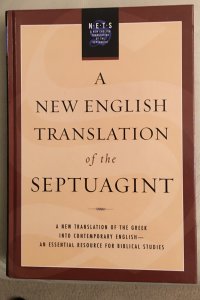jamiec
Well-Known Member
- Aug 2, 2020
- 557
- 259
- Country
- United Kingdom
- Gender
- Male
- Faith
- Catholic
- Marital Status
- Private
I use:Sorry I mistyped the title and the system won't let me edit it. I did not mean to type translation twice. One of them was ment to say versions.
the 1963 NASB
the 1970 NEB
the Latin Vulgate - mostly the New Testament
the 1972 edition of Luther’s Bible
the 1985 Jewish Publication Society TaNaKh
the ESV
the NIV NT
the 1954 BFBS Greek New Testament
the United Bible Societies Greek New Testament
the 1881-85-95 Revised Version, which is the older UK “cousin” of the 1901 American Standard Version.
The one I like most is the 1970s New English Bible listed above.
Upvote
0




 It's funny that you say that, given the chart you posted shows the NRSV to be in the dynamic translation category, yet that is the version most often used by academics.
It's funny that you say that, given the chart you posted shows the NRSV to be in the dynamic translation category, yet that is the version most often used by academics.